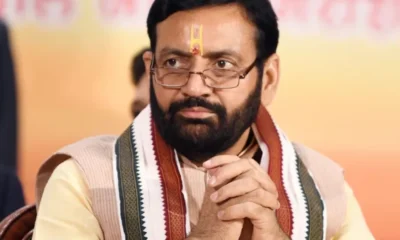In a significant intervention in the ongoing dispute over the special intensive revision (SIR) of voter rolls in West Bengal, the Supreme Court on Friday directed the Calcutta High Court to appoint judicial officers to assist in the process.
The top court said the move was necessary due to an “unfortunate scenario of allegations and counter allegations” between the West Bengal government and the Election Commission, which has led to a trust deficit between the two constitutional authorities.
Chief Justice of India Surya Kant observed that the process had stalled at the stage of examining claims and objections from individuals whose names were included in the discrepancy list. He noted that the court was compelled to pass an “extraordinary order” owing to “extraordinary circumstances”.
The judicial officers appointed by the high court will examine claims and objections related to the voter roll clean-up drive. The Supreme Court asked the Calcutta High Court to spare serving as well as former judicial officers in the rank of additional district judge or district judge to assist in each district.
Meeting of top officials ordered
To work out the operational details, the Supreme Court directed the State Election Commissioner, the chief secretary, the police chief and other senior officials to hold a meeting with the Chief Justice of the Calcutta High Court.
The court highlighted that the state is obligated to provide Group A officers to perform duties of Sub-Divisional Officers (SDOs) and Sub-Divisional Magistrates (SDMs). It pointed to a dispute over the rank and competence of officials deployed to function as Electoral Registration Officers (EROs) and Assistant Electoral Registration Officers (AEROs).
“It is nearly impossible for this court to determine the status and rank of officials now deployed by the ECI given by the state,” the bench observed.
Expressing dissatisfaction, the court said it was left with “hardly any other option” but to request the Chief Justice of the Calcutta High Court to deploy judicial officers to ensure fairness in adjudicating the genuineness of documents and decisions regarding inclusion or exclusion from the voter list.
Strong remarks from the bench
The Supreme Court made strong remarks over what it described as a lack of cooperation.
“A situation is being created where judicial officers have to intervene. We were expecting cooperation by the state. Is this the level of communication from the state?” Chief Justice Kant said, expressing disappointment over delayed responses to earlier orders.
Sharp exchanges were reported between senior lawyers representing the West Bengal government and the Election Commission. While the state argued that sufficient Group B officers had been provided, the Election Commission maintained that competent Group A officers capable of discharging quasi-judicial functions were not made available.
“You are not providing competent Group A officers. How can incompetent officials decide the fate of the people?” the court remarked, adding that there appeared to be hesitancy on both ends.
The bench stressed that cooperation from all stakeholders was essential and cautioned the state government to create an enabling environment for the judicial officers nominated by the high court.
“Please cooperate with the high court. Please create an environment for them to function. Imagine what will happen if the SIR process is not completed,” the court said.
Political backdrop
The SIR exercise has triggered a political row in West Bengal, with Chief Minister Mamata Banerjee accusing the Election Commission of targeting the state and misusing the voter roll revision to exclude genuine voters.
Earlier this month, she met top Election Commission officials in New Delhi and warned that she could mobilise large numbers of people to protest before the poll body.
Banerjee has also questioned why a similar SIR exercise was not conducted in BJP-ruled Assam and alleged that West Bengal and Kerala were being unfairly targeted.
With the Bengal assembly election approaching and major parties stepping up campaigning, the voter roll revision has become a central political flashpoint.


 Latest world news12 hours ago
Latest world news12 hours ago
 Cricket news12 hours ago
Cricket news12 hours ago
 Latest world news11 hours ago
Latest world news11 hours ago
 India News11 hours ago
India News11 hours ago
 India News58 mins ago
India News58 mins ago
 India News51 mins ago
India News51 mins ago
 India News32 mins ago
India News32 mins ago













